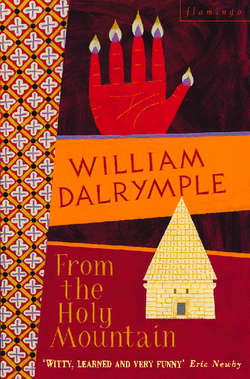Читать книгу From the Holy Mountain: A Journey in the Shadow of Byzantium - William Dalrymple - Страница 16
NIGHT BUS BETWEEN ANKARA AND ANTIOCH, 6/7 AUGUST
Оглавление4.15 a.m.: This is a horrible way to travel. It is nearly dawn, and the first glimmer of light has illuminated an expanse of flat plains covered by a wraith of thin mist. The rutted roads, the bracing crash of the long-defunct suspension, the snoring Anatolian peasants: these one expects and can bear. What is intolerable is the deliberate regime of sleep deprivation imposed on all passengers by this driver and his henchman, the moustachioed Neanderthal of a conductor.
Every other hour we pull in to some seedy kebab restaurant. The lights are put on, we are shaken awake and a Turkish chanteuse is put on the Tannoy so loud that we have no option but to vacate the bus. The driver and his friend disappear behind the scenes to pick up their commission from the restaurant owner, while we are all expected to make merry with plateloads of malignant kebabs or, even more horrible in the middle of the night, bags full of sickly-sweet Turkish delight.
Worse is to follow. On returning to our seats, the Neanderthal marches down the aisles, gaily shaking eau de cologne over the outstretched hands of the passengers. This can be quite refreshing at three o’clock on a hot afternoon; but it is irritating beyond belief at three o’clock in the dull chill of the early morning. And so on we trundle, rattling and shaking like a spin dryer, smelling like a tart’s boudoir, tempers rising steadily with each stop.
6 a.m.: We pull in to a particularly run-down kebabji which, with horrible inevitability, has suddenly materialised from nowhere amid the grey wastes of Anatolia. We stumble out of the bus and obediently line up for our breakfast, smelling like a collection of extras from some spectacular epic of an after-shave advertisement. Too weak to argue, too tired to care, I join the queue and load my plate with some slurry that must once have been an aubergine.
8 a.m.: Issus, site of Alexander’s great victory over the Persians. It may be one of the turning points in world history, but it’s a miserable-looking place now: a scrappy village with a petrol pump, a derelict electricity station and the statutory seedy restaurant over which hangs a terrible smell of grease and dead animal.
My neighbour in the bus, a garrulous traffic policeman from Istanbul, made the mistake of eating a kebab at the last stop and is now being noisily ill in the street; he has attracted a small circle of onlookers who appear to take the view that this is the most interesting thing to have happened in Issus for several months. Despite the early hour, it is already hot and muggy. We’re through the Cilician Gates and heading into the plains. On the far side of the road parties of bedraggled peasants are standing in lines, hoeing the dead ground beside the cotton and tobacco fields – or at least some are: most have put down their implements to watch my friend’s streetside evacuations.
The men here are a rough-looking bunch, scowling, ill-kempt and unshaven. But – looking around the motley crew filling the tables around me, and glimpsing my own reflection in the mirror – who are we to talk?
9 a.m.: Antioch: a gridiron of dirty alleyways surrounded on three sides by the crescent cliffs of Mount Silpius. As we leave the bus for the last time and stumble into the glare of the bus station the smirking Neanderthal offers us a last splash of eau de cologne. I shake my head, but get the horrible stuff poured all over me anyhow.
